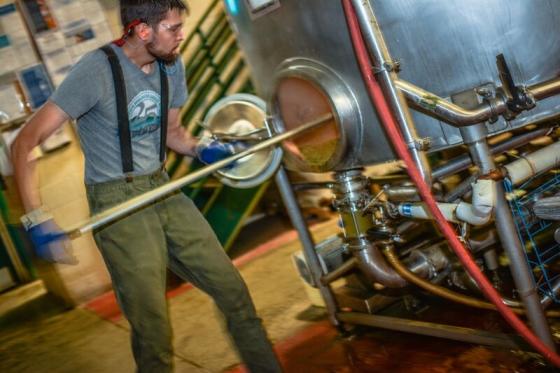Posted March 17, 2022 at 10:36am by Anonymous (not verified)
Craft beer industry growth

Written by Celia Riechel
Maple syrup and outdoor adventure may have put Vermont on the map, but increasingly, breweries are showcasing the best of the Green Mountain State. Vermont is at the forefront of a nationwide growth trend in the craft beer industry, ranking 1st in number of breweries and production per capita. From just six in 2005, Vermont’s commercial breweries grew to 44 in 2015, and today there are 51 members of the Vermont Brewers Association. According to the Brewers Association, Vermont breweries provide 1,890 jobs and contribute an estimated $377 million annually to the state economy. In 2014, 1.6 million people visited Vermont breweries, 1.2 million of whom were tourists.
Driving local brewers’ position at the front of the boom is the strength of the Vermont brand: clean water and air, family farms, thriving local communities, and abundant nature. As brewery operations grow, however, their potential impact on the foundation of the Vermont brand also grows. Consequently, breweries are regulated, and must typically work with multiple state agencies and programs to obtain all the necessary permits in areas such as drinking water, wastewater, solid waste, sanitation, and liquor control.
After a recent expansion project encountered permitting challenges, Long Trail Brewing Company CEO Dan Fulham knows this well. He notes that while the Long Trail name reflects strong environmental values and a desire to be a good steward of Vermont’s natural resources, “wanting to do the right thing only gets you halfway—you have to know what to do. When we were growing, we were focused on building our business and didn’t realize how the regulatory requirements differ and increase for larger operations.”
Understanding regulatory requirements can be confusing for any businesses, and compliance problems can harm the health of the business, the environment, and the public. Moving beyond compliance to becoming leaders in environmental sustainability—by adopting efficient water, energy, and waste practices—can significantly reduce costs and increase profitability. Helping Vermont’s food system businesses meet and go beyond regulatory requirements are critical to realizing several Farm To Plate goals to strengthen the food system, including increasing food processing and manufacturing capacity, increasing the number of food system businesses, and improving food system operations’ environmental stewardship.
Brewers focused on starting up or expanding may not even realize when they cross a regulatory threshold. For example, brewery wastewater can have concentrations of organic matter as much as 30 times higher than typical sanitary wastewater from homes and businesses. Breweries expanding production may need a pretreatment permit from the State of Vermont if their discharge is 5% or more of the organic treatment capacity or hydraulic capacity of the receiving wastewater treatment facility. Breweries that get their water from an on-site well, spring, or surface source must obtain a state permit and do regular water testing for contaminants.
After seeing an increase in regulatory violations from breweries, the State of Vermont’s Department of Environmental Conservation (DEC, a branch of the Agency of Natural Resources), decided to target breweries for assistance. “We were seeing that - large or small - breweries were making great beer, but were having trouble navigating regulatory requirements,” said Kim Greenwood, Director of DEC’s Environmental Compliance Division (ECD). Enter the Environmental Assistance Office (EAO), a unique program within ECD whose mission is to help the regulated community—including businesses, institutions, and residents—meet and surpass environmental requirements. The goal is not just to help breweries steer clear of trouble, but also to help them become more sustainable and profitable. “Many smaller businesses find they save money and increase profit margins after implementing sustainability practices. It’s a win-win.”
EAO, in collaboration with the Department of Economic Development (DED, a branch of the Agency of Commerce and Community Development), held two events focused on breweries earlier this year, covering regulations. “Most people want to do the right thing, but they may not know what they’re supposed to do, or they may not know how, or have access to the right services to be able to implement good practices.” Greenwood said. EAO also provides on-site compliance visits, where staff evaluate business practices and processes and offer recommendations for regulatory compliance and voluntary best management practices.
EAO is now partnering with the Toxics Use Reduction Institute (TURI) at UMass, Lowell, and the New Hampshire Department of Environmental Services on a grant application to the national Brewers’ Association. If awarded, EAO plans to broaden its effort to include more resources to help businesses implement cost-effective sustainability measures in wastewater, solid waste and food waste, hazardous chemicals, and cleaning. “We’re not just saying ‘you have to do this,’ we’re saying ‘you have to do this, you should consider doing that, and here is some funding and assistance to help you do them.’” Greenwood explained, “EAO’s work brings regulatory programs and funding and assistance programs together for brewers to access.” Improved business planning and technical assistance is another goal of the Farm to Plate Strategic Plan.
Other partners include the Department of Health (VDH), Department of Liquor Control (DLC), and the Natural Resources Board (NRB), Agency of Agriculture, Food, & Markets, as well as representatives of the Vermont Small Business Development Center (SBDC) and Vermont Economic Development Authority (VEDA). These collaborative efforts also align with Farm to Plate food system plan goals to help enforce regulations appropriate to scale and to improve strategic coordination among government and industry partners.
Visit the Environmental Assistance Office website to download the recent Brewery Day booklet, get help complying with environmental regulations, and to learn about upcoming events and trainings, or, call the EAO hotline at 800-974-9559.
Cover photo of Frost Beer Works, courtesy Vermont Brewers Association
